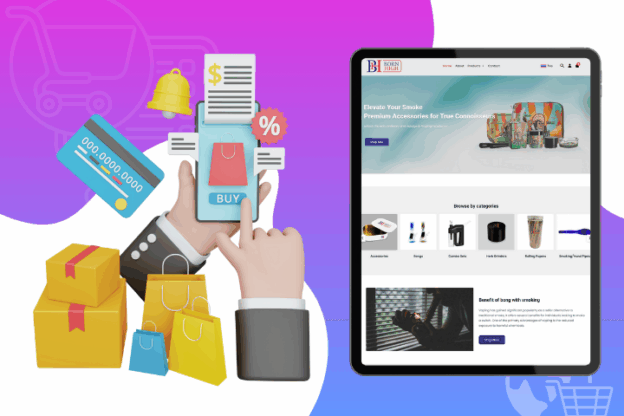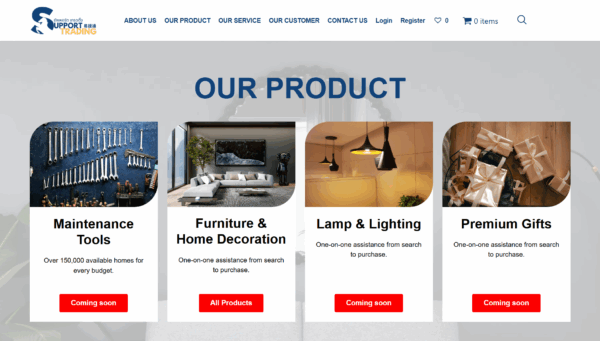Which Businesses Should Have Their Own E-commerce Website?

Many people think that e-commerce websites are only suitable for online stores. In reality, almost any business that wants to increase sales, build credibility, or expand its market can benefit from having an e-commerce website. Today, customers can buy products and services with just a few clicks, and businesses without an online sales channel may be missing out on significant opportunities. A professional website design makes it easy for customers to shop, access information quickly, and positions your business as professional.
This article will help you understand which types of businesses should have their own e-commerce website and how to start creating an online store tailored to your brand. This way, you can plan your sales strategy and grow steadily.
What is an E-commerce Website and How Does It Look?
An e-commerce website is an online platform that allows businesses to sell products and services directly to customers. Unlike regular websites, it operates as a comprehensive system covering everything from product selection, ordering, payment, to order tracking.
The most obvious examples are popular shopping platforms like Shopee and Lazada, which offer features that make buying and selling much easier than through a standard website. E-commerce websites typically include product pages with complete images and details, shopping carts, multiple payment options, order notifications, customer reviews, and special promotions such as discount coupons or flash sales.
Your own business e-commerce site can also include similar features, such as membership systems for loyalty points and order tracking, promotional notifications via email or push notifications, categorized product listings for easy searching, keyword search systems, as well as inventory and backend integration (Inventory, ERP). These features make woocommerce far more advanced than regular websites, which usually only display product information and contact details.
E-commerce website design focuses on both aesthetics and usability across mobile and desktop devices. Customers should be able to easily search and purchase products, trust payment methods, and return for repeat purchases. In this way, your website becomes more than just an online store it becomes a critical tool for generating revenue and building credibility for your business.
Which Businesses Should Have Their Own E-commerce Website?
Not every business with products or services must have an e-commerce website, but certain types of businesses gain clear advantages in sales and competitiveness by having an online storefront:
- Online Retail or B2C Businesses
Businesses that sell directly to consumers, such as clothing, cosmetics, home decor, IT gadgets, or food delivery, can greatly benefit. An e-commerce website allows customers to browse products, place orders, and pay instantly without needing to call or chat. You can also create online-only promotions, loyalty programs, or send special offers through email or push notifications, encouraging repeat purchases.
- Wholesale or B2B Businesses
Many assume e-commerce is only for retail, but wholesalers and manufacturers can also create their own platforms. This enables retailers or partners to place bulk orders directly, manage customer-specific pricing, generate quotes, and update product prices automatically, reducing repetitive communication and speeding up transactions.
- Businesses Wanting to Build an Online Brand Presence
Even if a business already sells on marketplaces like Shopee or Lazada, having a personal e-commerce website allows full control over the customer experience, web design, product presentation, credibility, and member-only promotions. Your website becomes a space to tell your brand story independently of external platforms.
- Businesses Expanding to International Markets
An e-commerce website makes it easier to reach international customers, supporting multiple languages, currencies, and payment options. Selling through Thai marketplaces alone makes international expansion difficult. Your own website allows foreign customers to purchase directly, cutting out intermediaries and opening global growth opportunities.
- Businesses Creating Unique Customer Experiences
E-commerce websites can be designed to deliver personalized experiences, such as product recommendation systems, service booking, VIP membership, exclusive promotions, or real-time customer chat. These tailored experiences help customers remember your brand and build long-term relationships.
Benefits of Having Your Own E-commerce Website
Having your own e-commerce website is not just a trend or about aesthetics. It's a fully controlled sales channel. Unlike marketplaces like Shopee or Lazada, which are easy to access but have limitations, a personal website offers:
- Full control: You can design pages to match your brand, arrange products strategically, and manage the customer experience from homepage to payment. This reduces costs and platform fees, since marketplaces usually charge commissions or promotional fees, whereas your own website allows flexible pricing and higher profit margins.
- Customer insights: You can collect and analyze detailed customer behavior—see who viewed what, which products are popular, and which promotions work best. This data helps improve products, personalize promotions, and refine marketing strategies.
- Market expansion and credibility: Your website serves as a professional online storefront, builds customer trust, and supports international sales through multi-language and multi-currency features.
In summary, owning an e-commerce website gives businesses more control, reduces costs, improves customer insights, and builds credibility, ensuring sustainable growth and stronger online presence.
E-commerce Website Costs in Thailand
Many wonder about the investment required for an e-commerce website in Thailand. Budgeting mainly depends on feature complexity and business needs.
A basic e-commerce website with essential features like product pages, shopping cart, online payment, and contact page typically costs tens of thousands to hundreds of thousands of baht, depending on the number of products, membership system, backend integration, or brand-specific features.
For businesses wanting a fully featured website such as promotional notifications, product recommendations, inventory management, or ERP integration the cost increases with complexity. Choosing an experienced developer and planning features in advance helps control costs and ensures the website meets your needs and is ready for real-world use.
Conclusion
Having your own e-commerce website is not a luxury or limited to online stores. It’s a crucial tool that helps any business expand markets, increase sales, and build credibility.
Businesses that benefit from an e-commerce website include online retailers, wholesalers or manufacturers, companies building an online brand, businesses expanding internationally, and those creating unique customer experiences. Owning a website allows you to fully control the customer journey, reduce platform fees, gather insights to improve services, and build trust. Whether you run a small or large business, a well-designed website is a key step for sustainable and professional growth.
If you’re looking for e-commerce website experts in Thailand, Digital Agency Bangkok is ready to turn your ideas into a functional website that helps your business grow and reach customers professionally.
Call: 098-7655-243 or 098-7655-701
Email: [email protected]

FAQ – Frequently Asked Questions
Q1: Does every business need an e-commerce website?
A1: Not every business, but those aiming to sell online, expand markets, build a brand, or create unique customer experiences benefit the most from an e-commerce website.
Q2: How is an e-commerce website different from selling on Shopee or Lazada?
A2: Your own e-commerce site gives full control over design and customer experience, reduces fees, collects customer data for analysis, and allows brand-specific features, while marketplaces impose platform rules and limitations.
Q3: Should small businesses create their own e-commerce website?
A3: Small businesses can start on marketplaces, but having their own website builds credibility, adds sales channels, and prepares for future market expansion.
Q4: Does creating an e-commerce website require a high budget?
A4: It depends on features and complexity. Basic websites are affordable, while full-featured sites with backend integration websites cost more, depending on your business needs.
Q5: How do I start creating an e-commerce website suitable for my business?
A5: Identify your products and required features, choose an experienced developer, plan design and user experience, and prepare product data and backend systems to ensure a smooth and goal-oriented website.





